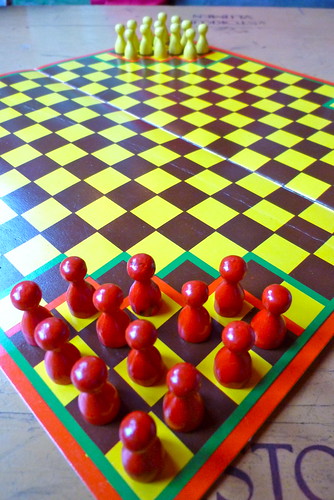Welcome to Word Soup Wednesday! While the television show The Soup brings you “the strange, obscure and totally unbelievable moments in pop culture, celebrity news and reality TV,” Word Soup brings you those strange, obscure, unbelievable (and sometimes NSFW) words from talk shows, sitcoms, dramas, and just about anything else on TV.
analog books
Anderson Cooper: “In just a few weeks, you’ll be able to download e-books – is that what the kids do with the digital download? they download them? I still read analog books for the most part.”
“The RidicuList: Classic Novels,” Anderson Cooper 360, July 18, 2012
Analog books, or paper books, are the opposite of e-books. Analog or analogue refers to “a device in which data are represented by continuously variable, measurable, physical quantities, such as length, width, voltage, or pressure,” and is opposed to digital, “expressed in numerical form, especially for use by a computer.” Analog has come to refer to technology that is older or out-of-date.
anaphor
Jon Stewart: “By using the phrase ‘you didn’t build that,’ you create confusion by using the demonstrative singular pronoun, ‘that’ instead of the plural anaphor, ‘those,’ which of course would be referring to the antecedent, ‘roads and bridges’. . . .My butt is giving myself a grammar wedgie!”
The Daily Show with Jon Stewart, July 25, 2012
An anaphor is “a word (such as a pronoun) used to avoid repetition; the referent of an anaphor is determined by its antecedent.” The word anaphor ultimately comes from the Greek anapherein, “to carry back, to bring up.”
breastaurant
Anderson Cooper: “Still, the breastaurant owner – not my word, by the way, it’s on their website – wants to turn [the town he bought and renamed Bikinis] into a world-class destination, possibly with a bikinis hall of fame.”
“The RidicuList: Bikinis, Texas,” Anderson Cooper 360, July 25, 2012
Breastaurant is a blend of breast and restaurant, and refers to establishments such as Hooters and, in this case, a restaurant called Bikinis, in which waitresses wear skimpy uniforms that show off their breasts.
Claus-esque
Anderson Cooper: “Plus I think changing the shirt wasn’t really going to help in this case. He happens to be highly Claus-esuqe. What’s he going to do? Take off his face?”
“The RidicuList: Santa problems in Disney,” Anderson Cooper 360, July 26, 2012
Claus-esque means having qualities similar to Santa Claus. This story is regarding Disney theme park officials asking a visitor who resembled Santa Claus to tell children approaching him for pictures that he was on vacation and should be left alone. See Kafkaesque.
epidermicide
Smitty [to criminal robot Roberto]: “You’re under arrest for attempted epidermicide.”
“The Six Million Dollar Mon,” Futurama, July 25, 2012
Epidermicide is the act of skinning someone, or “killing” their skin or epidermis.
ethanol
Bruce Babcock: “About 35-40 percent of the [corn] crop normally goes to ethanol.”
Stephen Colbert: “So am I going to have to fight my Audi for lunch?”
Bruce Babcock: “Well, there is going to be a bit of a fight between ethanol plants and livestock producers about who gets that corn.”
The Colbert Report, July 24, 2012
Ethanol is “the intoxicating agent in fermented and distilled liquors; used pure or denatured as a solvent or in medicines and colognes and cleaning solutions and rocket fuel; proposed as a renewable clean-burning additive to gasoline.” The story above refers to the effect of an ongoing drought in the midwest on corn crops.
Glass-Steagall Act
Sloan: “After the Great Depression, Congress wanted to put a firewall between the investment banks and the commercial banks. They wanted to make sure that Wall Street could melt to the ground and the commercial banks couldn’t be touched. They passed a law, the Glass-Steagall Act. Now you could be Gordon Gekko or George Bailey, but you couldn’t be both.”
“Amen,” The Newsroom, July 22, 2012
The Glass-Steagall Act is also referred to as the Banking Act of 1933, and is “named after its Congressional sponsors, Senator Carter Glass (D) of Virginia, and Representative Henry B. Steagall (D) of Alabama.” The act was “repealed through the Gramm-Leach-Bliley Act in 1999 by President Bill Clinton.” Gordon Gecko is a character from the film Wall Street and is famous for his quote, “Greed is good,” while George Bailey is the main character from the film, It’s a Wonderful Life.
gotcharazzi
Stephen Colbert: “Of course the media gotcharazzi are saying that ‘Anglo-Saxon’ is some sort of racial code word, as in white Anglo-Saxon Protestants. But Mitt’s campaign isn’t saying that he’s a WASP. They never said ‘white’ or ‘Protestant.’ They’re just saying that he’s an ‘AS.’”
The Colbert Report, July 25, 2012
Gotcharazzi is a blend of gotcha and paparazzi. The paparazzi, plural for paprazzo, “a freelance photographer who doggedly pursues celebrities to take candid pictures for sale to magazines and newspapers,” may say, “Gotcha!” as they catch someone in a compromising position.
insourcing
President Obama [regarding Mitt Romney’s time at Bain Capital]: “I don’t want to pioneer in outsourcing. I want some insourcing. I want to bring companies back.”
“Keeping Them Honest,” Anderson Cooper 360, July 16, 2012
Insourcing is “the obtaining of goods or services using existing in-house resources or employees,” and is the opposite of outsourcing, “the procuring of services or products, such as the parts used in manufacturing a motor vehicle, from an outside supplier or manufacturer in order to cut costs.” The word outsourcing originated around 1981, while insourcing seems to have come about shortly afterward. See also offshoring and inshoring.
meat puppet
Robot Hermes [regarding the puppet made from his human body parts]: “That meat puppet disgusts me. It’s time for the ultimate upgrade.”
“The Six Million Dollar Mon,” Futurama, July 25, 2012
Meat puppet, or meatpuppet, has multiple meanings. In Ursula Le Guin’s short story, “The Diary of the Rose,” it seems to refer to humans as unthinking bodies. A popular current definition is “one whose sole reason for participating in a discussion or forum is to support, or express agreement with, a friend.” The Chronicle of Higher Education describes a meat puppet as “a peculiar inhabitant of the digital world—a fictional character that passes for a real person online.”
In this episode of Futurama, meat puppet is being used both literally – Robot Hermes is referring to a puppet made of human meat – and as a derogatory term for a human.
oocephalus nectar
Professor Farnsworth: “Say why don’t you just have Kif get you some nectar? It comes from a flower on his home planet.”
Kif: “You mean it’s oocephalus nectar?”
“The Butterjunk Effect,” Futurama, July 18, 2012
Oocephalus means egghead, and comes from the Greek combining word for “egg,” and kephale, “head.” The nectar here is a steroid-like performance enhancer.
world charm offensive
Stephen Colbert: “He’s on the first leg of his world charm offensive, and Mitt really grabbed England by the crumpets when he was asked about the London games.”
The Colbert Report, July 26, 2012
A charm offensive is “a campaign of deliberately using charm and flattery in order to achieve some goal; especially in a political or diplomatic field.” The phrase seems to have originated in the mid 1950s, with offensive as a military term meaning “an aggressive attitude or course of operations; a posture of attack.” See Tet Offensive.
A world charm offensive is a world-wide charming campaign, and in this context offensive has the additional meaning of “causing or giving offense.”
That’s it for this week! Remember, if you see any Word Soup-worthy words, let us know on Twitter with the hashtag #wordsoup. Your word and Twitter handle might appear right here!




